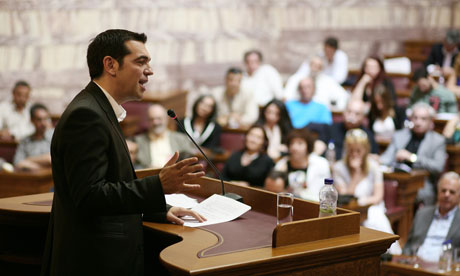Ian Traynor, Europe editor guardian.co.uk, Thursday 17 May 2012 17.47 BST
While EU leaders now talk publicly of Greece leaving the euro, a little more flexibility could yet keep the currency intact
Alexis Tsipras, the main beneficiary of the stalemate in Athens, is likely to improve his performance in the election rerun. Photograph: Martin Godwin
We'd really like you to stay, but sorry, you may have to leave. This is the message now being sent to Greece by Europe's key leaders in the space between the election earthquake of 6 May and the ballot rerun on 17 June.
For the first time in 30 months of crisis, Europe's leaders have been talking publicly of a country being forced to quit the euro. There is no doubt a "Grexit" will do immense damage to Greece and to Europe.
It's a question of scale – containment or contagion.
No one really knows whether a Greek departure will result in an exponentially bigger Spanish and Italian crisis that could kill the currency and perhaps mortally wound the EU, or whether the fallout will be restricted to Greek calamity and collateral damage to European banks that can be lived with.
The fact that leaders such as José Manuel Barroso, Olli Rehn, Angela Merkel, and Wolfgang Schäuble are publicly discussing the eventuality of a Greek exit suggests strongly they think the damage can be limited, that they've used the past two years to quarantine Greece.
They may be right. But it's a gamble. It would not be the first time in 30 months they have miscalculated.
EU leaders also mean it when they say they'd prefer to keep Greece in the euro. To that end, they are now effectively telling the Greeks how to vote on 17 June – for the two big discredited parties, New Democracy and the socialist Pasok, whose combined vote collapsed from 79% to 32% 12 days ago.
These may be extraordinary times. But it would be more than extraordinary to see such an electoral shift within six weeks. All the signs so far are that the young firebrand bailout rejectionist, Alexis Tsipras, – the main beneficiary of the stalemate in Athens – is likely to improve his performance in the election rerun. He is said to be heading to Berlin and Paris next week for talks on the next moves.
If Greece is to stay in the euro, something has to give – on Tsipras's rejection of the "memorandum" (what Greece has to do to receive the bailout) and/or on Berlin's rules-bound approach that brooks no wavering nor flexibility in administering the medicine.
Despite the impression of strictness, Merkel has shifted several times in the crisis, always at the very last minute and arguably too late, reactively rather than pre-emptively. She hinted at another shift on Wednesday.
"If Greece believes that we can find more stimulus in Europe in addition to the memorandum, then we have to talk about that," she said.
Relaxing the timetable of Greece's deficit reduction and budget cuts, for example, could help, allowing the economy to breathe a little rather than being strangled in the depths of recession.
The same could be said about Spain, or even the Netherlands, a healthy economy that nonetheless is grappling with a deficit dilemma, which would be much more easily repaired over three to four years than one to two.
The rightwing Spanish government sounds committed to slashing spending, tearing up Spain's social contract and making the structural changes it needs to meet the eurozone budget deficit targets.
But it can't do anything about Greece. It fears being next in line of fire for the financial markets. It is angry that Berlin and Paris are failing to fix the euro, leaving Madrid highly vulnerable to events outside its immediate control.
Greater flexibility and longer timelines for debt reduction would allow the new star of Greek politics to argue that he won his "renegotiation" of the terms of Greece's rescue. The Germans would still stress that austerity remains sacrosanct. The new French regime would declare that it is already making a difference, that its emphasis on growth strategies is already paying dividends.
The time and the place to agree this is next Wednesday at a special EU summit in Brussels.
If Greece is to stay in the euro, something's got to give | World news | guardian.co.uk
![The [Greek] European Tragedy](https://blogger.googleusercontent.com/img/b/R29vZ2xl/AVvXsEiWKI5s90SFm1wWTk6bs4p7CgslaC2SnYPsrZhb-B-smOufNNCSxCvpBLI9hOB-LsXZjir_PNmEiMk2-E62F3xkg96IoC6QFAaZAnPRTVH340IN9WBRmWJqPkjWlgyRj3zpALp7h6hvA58/s920/GkBack_new.jpg)

